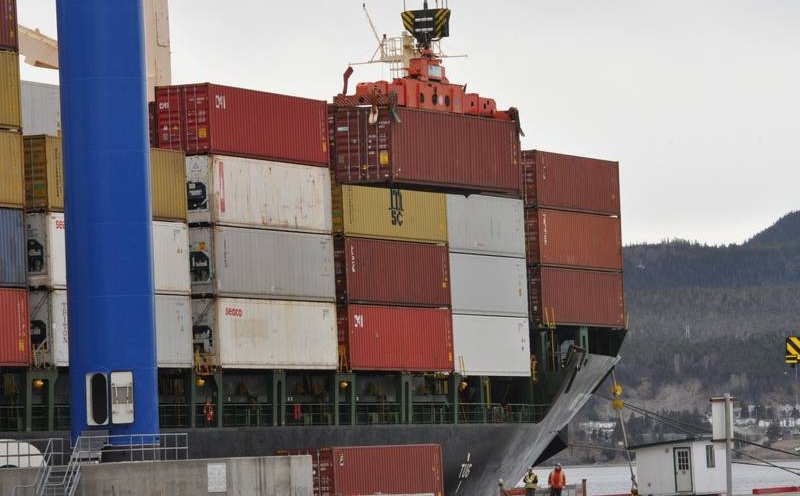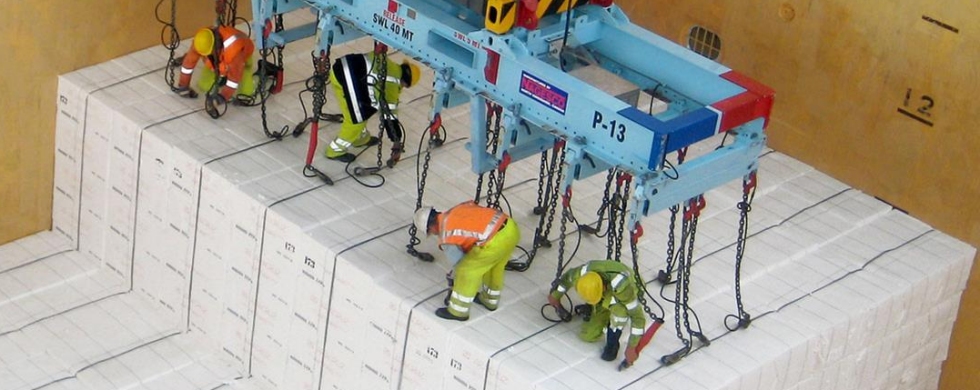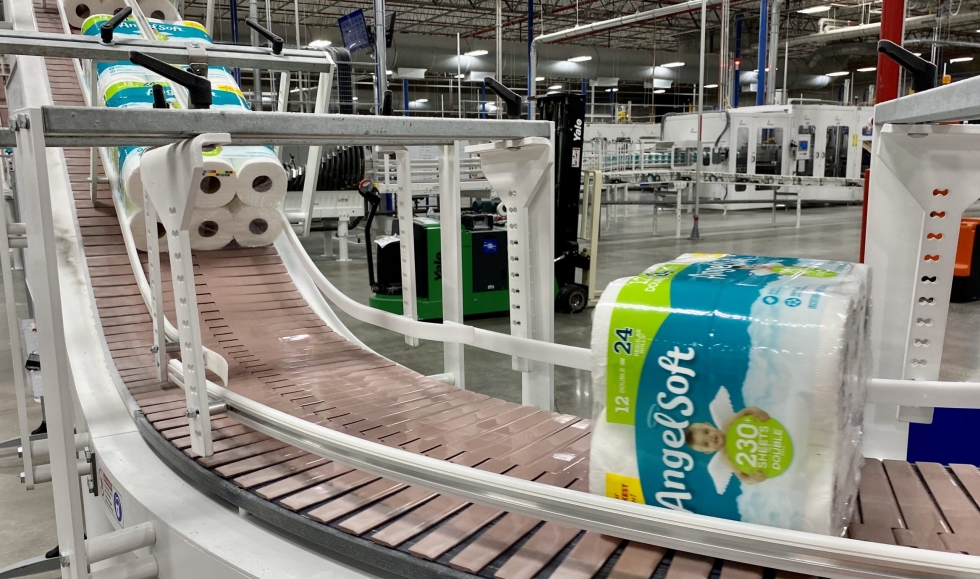|

Corner Brook Pulp and Paper Begins Shipping Project Out of Port of Corner Brook
May 15, 2020 - Corner Brook Pulp and Paper in Newfoundland, Canada, will now be able to access markets pretty much anywhere around the globe as a partner in an international shipping project operating out of the Port of Corner Brook.
The $11-million project is a result of a partnership between the Corner Brook Port Corporation, Logistec Stevedoring Inc., and Corner Brook Pulp and Paper, which is the base business in the effort, with support from the federal government.
“You have to have an initial customer to ensure that the business piece works,” said Darren Pelley, Corner Brook Pulp and Paper’s general manager, of the role of the mill.
The arrival of a Mediterranean Shipping Company (MSC) vessel at the port on Tuesday, May 12 with 350 empty shipping containers signaled the official start of the project.
Starting in the next few days at least 200 of those containers will be moved to the east side of the mill where they will be loaded with paper and then moved back to the dock area of the port. When the next MSC ship arrives, the containers will be loaded onto it with plans for the first shipment, destined for China and India, to leave the port on June 1.
Pelley said the mill has a target to ship out a minimum of 350 containers per month. Where that paper goes will fluctuate depending on the markets and in the future will include Asia, South American, Latin American, and Europe. The bonus for the mill is that it will be able to expand on where it can serve.
“What we’ll be able to do now is we’ll be able to access the best markets throughout the globe that were not available to us before,” said Pelley.
Traditionally, the mill shipped the bulk of its paper via paper carriers that arrive directly at the mill. There was a paper carrier at the mill on Tuesday and Pelley said that will continue to happen.
Between 35 to 40 per cent of its paper was trucked to Halifax to be shipped through international containers there. The ratio of what was trucked was driven by the availability of trucking on that route.
“Up to this week our quantity of paper shipped by international roots was constrained by the availability of travel to Halifax,” said Pelley.
Now the company will be able to increase the ratio of what goes out directly from the mill with the service through the port. That means it will have to truck a smaller amount to Halifax and this will also result in reducing the transit time.
Read the complete sstory at Saltwater Network |
|
|

Södra Ends Furlough Schemes at Sawmills in Orrefors and Mönsterås, Sweden
May 12, 2020 - Södra announced that it has ended furlough schemes that began in April at its sawmills in Orrefors and Mönsterås, Sweden.
Södra ended the furlough scheme at Orrefors at the end of April and now at Mönsterås.
At the beginning of April, Södra announced furlough schemes at its sawmills in Orrefors, Mönsterås and Hamina (Finland) in light of reduced demand related to the ongoing pandemic.
"We decided to introduce a furlough scheme because the UK was closed," said Jörgen Lindquist, President of the Södra Wood business area. "The UK market is gradually re-opening and we have also identified new business opportunities, which is why we will be resuming normal production rates at Mönsterås by 18 May.
"We were already low-staffed at Mönsterås before the crisis and will now need to recruit 5-6 new employees when we scale up to full production," Lindquist added.
Södra is waiting to restart production at the sawmill in Hamina, however, which essentially delivers only to the UK.
"We are seeing several positive signals and monitoring the market carefully in order to decide when we should resume full production at Hamina," Lindquist noted.
Södra said it will continue to prioritize the harvesting of damaged forest, and other harvesting will be subject to geographic differences, depending on possible deliveries to the mills.
Södra's construction timber is produced at the company's seven sawmills — six in Sweden and one in Finland.
About Södra
Södra is Sweden's largest forest-owner association, with 52,000 forest owners as its members. Södra is also an international forest industry Group, with operations based on processing its members' forest products, such as softwood and hardwood pulp, and wood products. For further information, visit: www.sodra.com
SOURCE: Södra |
|

Effects of the COVID-19 Pandemic on Brazil’s Forest Sector
By Marcelo Schmid, Manager of Forest2Market's operations in Brazil
April 27, 2020 - Some players in the Brazilian forest-based industry are doing well in the face of the economic crisis caused by the coronavirus. But while the country’s pulp sector has largely been unaffected, the packaging sector has been hit hard.
Pulp Sector Reduces Inventories
Brazil is the largest global producer of market pulp and this segment is undoubtedly the most important for the Brazilian forest supply chain. While the pulp segment experienced a drop in foreign demand and exports in 2019, this created an increase in inventories among the major Brazilian producers.
The coronavirus pandemic has caused the global consumption of toilet paper to increase worldwide, which has helped to reduce large inventories and normalize production. Although this increase in consumption has been driven by a temporary sense of “panic,” the general feeling is that a market shift has occurred and the consumption of toilet and tissue paper will increase in the future as overall health and hygiene habits have changed.
Lumber Production Expected to Return to Normal in May
The situation for lumber and panel producers varies and depends primarily on the end market for each wood product. Some companies are reporting a reduction in shifts and layoffs due to reduced demand, however, others pointed out that the operations have not yet suffered a significant impact.
It is also clear that the economic effects on manufacturing operations have not been caused by structural market problems (i.e. lack of demand), but rather by restrictive measures put in place by municipal and state governments. As such, many of the clients we have consulted predict that activity will spike in May and head back towards “normal.” In general, popular export products, such as frames and related components, are less affected than products sold into the domestic market and the retail consumer sector.
Packaging Sector Suffers Greater Impact
Speaking of the domestic market, the Brazilian packaging sector represents the segment of the forest-based industry that is suffering the most impact at the moment, and it is not very difficult to understand why. The packaging segment is closely linked to the consumption of different finished products such as food, footwear, household appliances, among others. Since the consumption of various goods has been severely affected in recent weeks due to the reduction in consumer buying habits, the demand for packaging that accompanies these products has also been drastically reduced.
Plywood Sector May be Affected if Quarantine Continues
The civil construction segment, another major consumer of forest-based products, appears not to have been excessively affected by the pandemic. The sector has been recovering after a period of decline. However, with the projected decrease in construction activity on the horizon combined with restrictive “shelter in place” measures across the country, the outlook for April and May is bleak. If the quarantine lasts for another two months, the issue will begin to impact specific sectors within the forest supply chain, such as plywood manufacturers.
SOURCE: Forest2Market |
|

Metsä Fibre and Ahlstrom-Munksjö Collaborating on Responsible Sourcing of Wood
April 30, 2020 - Metsä Fibre and Ahlstrom-Munksjö continue the collaboration by focusing on responsible wood sourcing. Ahlstrom-Munksjö, as a significant wood pulp consumer, and Metsä Fibre, as the world’s leading producer of bleached softwood pulp, have a particular responsibility to advance environmental performance and sustainability throughout their operations and supply chains.
“We are committed to contributing to United Nations Sustainable Development Goals by reducing negative impact across the value chain. The collaboration with both the suppliers and customers is very important in developing and implementing our sustainability strategy, and thereby achieving these goals,” says Heli Nykänen, Manager, Group Sustainability and Capital Investments.
The project that started in 2019 has mainly focused on responsible wood sourcing in the value chain from the forest to the end-products. As part of the partnership, the companies organized a supplier visit in Finnish Lapland for 3M and Nestlé which are among Ahlstrom-Munksjö’s key customers. The in-depth visit was led by Earthworm Foundation who is 3M and Nestle’s Policy implementation partner. The visit covered the Metsä Group’s wood procurement practices in the Lapland area as well as its impact on indigenous people. During the visit, the participants had an opportunity to discuss local forestry practices with all relevant stakeholders.
“Responsible forest management and wood procurement practices are essential to our operations. We are proud of our strong traditions in Finnish forest management as well as our actions in promoting responsible forestry practices,” says Vesa Junnikkala, Director Sustainability, from Metsä Group Wood Supply and Forest Services.
Ari Harmaala, SVP Sales and Customership, Metsä Fibre, added, “At Metsä Fibre, we want to create value for our customers and their business. We have ambitious 2030 sustainability targets, and we see that proactive sustainability collaboration with customers and other stakeholders is beneficial for the whole value chain. Sustainability and responsibility are an integral part of everything we do, and last year our strong commitment in sustainability was recognised in the international EFQM quality competition, where we won the Outstanding Achievement for Sustainability Award and reached the EFQM rating Recognised for Excellence 6 Stars.
“Both Ahlstrom-Munksjö and we are highly committed to driving responsibility not just in our own operations but also within the industry.”
About Ahlstrom-Munksjö
Ahlstrom-Munksjö is a global leader in fiber-based materials, including filter materials, release liners, food and beverage processing materials, decor papers, abrasive and tape backings, electrotechnical paper, glass fiber materials, medical fiber materials and solutions for diagnostics, as well as a range of specialty papers for industrial and consumer end-uses. For further information, visit: www.ahlstrom-munksjo.com.
About Metsä Fibre
Metsä Fibre, part of the Metsä Group, is a leading producer of bioproducts and bioenergy. Metsä Fibre produces pulp and other bioproducts at four mills in Finland: Joutseno, Kemi, Rauma and Äänekoski; and also has six sawmills: Kyrö, Lappeenranta, Merikarvia, Renko and Vilppula (in Finland) and in addition, Metsä Svir sawmill in Russia. For further information visit: www.metsafibre.com.
SOURCE: Metsä Fibre |
|

Don't Worry: TP Is Made in the USA
Georgia producers meeting toilet paper demand
April 28, 2020 - As Americans adhere to social distancing guidelines amid COVID-19 concerns and stock up for extended periods at home, shoppers are repeatedly having difficulty stocking up on an essential item - toilet paper.
Images and videos shared across social media show long retail lines, panicked consumers and depleted stocks of bathroom tissue. However, many may not realize this everyday necessity is largely manufactured in the U.S., with Georgia featuring more acreage devoted to timberland than any other state.
Although recent demand has been higher than normal, household paper manufacturers, many of which have major operations in Georgia, have been adjusting production schedules to ensure a steady flow of products reaches store shelves.
For example, the Atlanta-based manufacturer Georgia-Pacific, maker of Quilted Northern and Angel Soft brand bathroom tissue and one of the world's largest suppliers of paper products, has seen significant demand in their retail business, specifically for tissue and towel products, and expects to see those trends continue for the time being.
"As a company, we have our teams working cooperatively and quickly together to deliver as much product as we possibly can," said Eric Abercrombie, spokesman for Georgia-Pacific. "We are working hard to maximize the number of deliveries we can load and ship out of our facilities. In fact, a few weeks ago our mills and regional distribution centers managed to ship out around 120 percent of normal capacity, and we're also working with customers to have direct shipments when possible to reduce distribution time."
International Paper is another major supplier operating in Georgia. In a statement to International Paper's global team members, CEO Mark Sutton said the company plays a critical role in the supply chain. Sutton added that plants are operating safely.
"There has never been a more important time for International Paper to deliver the products we make," Sutton said.
Paper products are a major economic driver in the U.S., especially in Georgia, where the forestry industry generates $36.8 billion in annual economic impact.
The state is home to nearly 1,400 forest product manufacturers and consistently ranks as a top producer of pulp and paper in the U.S. Major forest products importers and exporters through Georgia's ports include Interfor, International Paper Company, Georgia-Pacific, Rayonier, FR Meyer's Sohn and Georgia Paper.
As the No. 1 East Coast port for forest products, the Georgia Ports Authority handles about a quarter of U.S. forestry exports each year.
Georgia's deepwater ports and inland barge terminals support more than 439,000 jobs throughout the state annually and contribute $25 billion in income, $106 billion in revenue and $2.9 billion in state and local taxes to Georgia's economy. The Port of Savannah handled 8.5 percent of U.S. containerized cargo volume and 10 percent of all U.S. containerized exports in FY2017.
SOURCE: Georgia Ports |
|
|